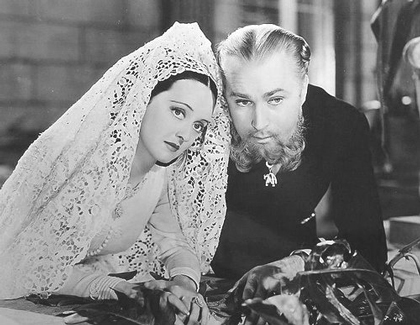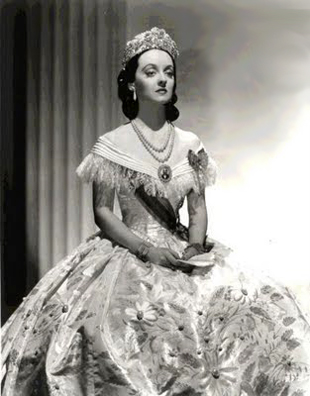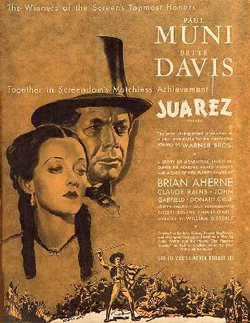
 |
|
|
|
By 1939 Paul Muni's name had become synonymous with popular impersonations of famous historical figures. The early- '30s Muni of Scarface and radical social issue movies gave way to an actor who buried himself in beards to play famous politicians, doctors and authors. Perhaps his most convincing role was Benito Juarez, the President of Mexico (1858-1972) in Hal Wallis' historical epic, Juarez. Muni is the spitting image of the Mexican indian who rose to power at a time when Latin America was changing from aristocratic rule to often dubious republics. Juarez is almost unique among Hollywood historical dramas for its relative fidelity to the facts, which occasionally work against the flow of its story. Bette Davis was eager to play Carlota, the legendary mad Empress. Audiences primed to expect an historical romance were surely surprised to see Davis disappear from the screen for long stretches of time. The show was trimmed by a reel during its original release, with the order of some scenes reportedly rearranged. Had it been made twenty years later Juarez might have become a massive Road Show epic with huge battle recreations, etc.; it sounds like a perfect subject for a 3.5-hour Samuel Bronston blockbuster. 
The show is named after a Mexican statesman and its main attraction is Bette Davis, but Juarez spends most of its time with Maximillian I (Brian Aherne), an Austrian archduke who accepted the crown of Emperor of Mexico when offered by a group of aristocrats (and French power brokers) desiring to re-establish a Europe-friendly monarchy on the Americas. Louis Napoleon III (Claude Rains) and his Empress Eugenie (Gale Sondergaard) congratulate themselves for fooling the naïve Maximillian and his wife Empress Carlota (Bette Davis) into accepting the throne. The benevolent Von Habsburgs are told that the overwhelming majority of Mexicans had asked for them. In reality, Max and Carlota are the puppets of a French intervention, and the unknowing usurpers of the rightful government of President Juarez (Paul Muni). Maximillian turns out to be a benevolent soul who believes in the concept of a responsible monarchy. The aristocrats and generals cannot force him to restore the old hacienda system of peons and masters. Max instead offers Juarez the job of Prime Minister, which the old Indian turns down. Juarez's forces get the upper hand after Max signs an oppressive decree. With the American Civil War finished, Louis Napoleon drops his support and the French legionnaires prepare to leave Mexico. Carlota returns to France to protest the abandonment of her husband. Surrounded by the Juarista armies of Porfirio Diaz (John Garfield), Max changes direction once too many times. Having decides to abdicate, he reverses course and determines to uphold the honor of his noble class by staying to the bitter end. 
The reasons that Juarez did not become a classic are obvious; they're also what make it a worthwhile historical drama. John Huston's name is first up as a screenwriter but we're told that much of his input was to help chop down the original overlong script. What remains is some fine drama and a lot of talk conveyed as expertly written exposition. Muni and Aherne vocalize their positions as exponents of representative democracy and traditional monarchy. A veritable army of supporting characters play Mexican aristocrats & French interventionists (Donald Crisp, Gilbert Roland, Henry O'Neill, Louis Calhern, Montagu Love, John Miljan, Irving Pichel, Pedro de Cordoba, Noble Johnson) against a shorter list of Juarista patriots. Vladimir Sokoloff is the President's aide, while New Yorker John Garfield plays his only period-picture role as the chief Juarista general. It's common practice to make fun of Garfield's Bronx accent, a silly charge considering the polyglot of ethnicities that crowd the screen. Although the movie only has about twenty minutes of romantic content with Bette Davis, they're all choice material. As Erich Wolfgang Korngold segues into an instantly heartbreaking love theme (which he later adapted for his famous concerto) Davis puts those famous eyes to work. Carlota supports her husband but suffers one disillusion after another. The plebiscite was false, she cannot have children, she must allow her husband to adopt a boy to be the new heir. If Max is a faithful political dinosaur Carlota is equally devoted to her royal role -- the moment when she offers to leave him so he can bear an heir of his own with someone else is deeply affecting. Louis and Eugenie's treachery is too much for Carlota, and Davis and Dieterle sketch a beautiful series of expressionist scenes to chart her swift descent into madness. The panicked Carlota flees from a French drawing room into a dark void, and reaches her hand out to a window as if communicating with her lost Maxim through mental telepathy. Over powerful images of ocean waves, composer Korngold makes masterful use of the beautiful Mexican song La Paloma to suggest the lovers' souls touching one another across a 4,000-mile gap. Love beyond rational barriers is suggested without being insisted upon. 
Juarez is also an expression of Hollywood politics in 1939, a time when studios were avoiding pictures directly condemning German fascism. It's not difficult to associate the "man of the people" Juarez with democratic values, versus the well-intentioned but unacceptable ideology of Maximillian Von Habsburg. The movie takes pains to inject the American viewpoint at several junctures, mostly with Louis Napoleon's fear of the Monroe Doctrine. Juarez pretends that the U.S. policy statement was internationally recognized law, as opposed to a unilateral nationalistic claim to territorial economic rights (a North-South America co-prosperity sphere?). Legal or not, after England's bad experience the European powers desired to outflank the U.S, not oppose it directly. Conservative thinkers will have no problem seeing Juarez as an expression of leftist Hollywood ideology. The picture sides completely with Juarez, who comes off almost as a Mexican Lenin. His land reforms will sound too much like radical social justice for some temperaments. The underrated Joseph Calleia is very good in the thankless role of a treacherous Juarista vice president, that Stalin sympathizers might have interpreted as a Trotsky stand-in. Benito Juarez is continually associated with Abraham Lincoln in both actions and philosophy, yet he justifies holding power during the civil strife as an "emergency measure". As did the Bolsheviks, Juarez sees the necessity of withholding clemency and executing Maximillian. Sincere or not, the Austrian usurper caused too many deaths, and a strong message needed to be sent that no monarchists would be tolerated in Mexico, ever again. Let me know if you find an American movie made at any time that takes a similar attitude toward the killing of Czar Nicolas and his family! 
Actually, Juarez sends a curious set of mixed messages. At UCLA in the early 70s the film's Benito Juarez seemed like a template for Ho Chi Minh, a nationalistic leader defending his country against hostile foreign colonials. Yet, without distorting history, the movie sets up Maximillian as a Christ figure, complete with a last supper and a Judas-like officer (played by Gilbert Roland) who thinks he's doing Max a favor with his betrayal. Maximillian's stubborn insistence on martyrdom is presented as a noble ideal. Juarez doesn't fall on too many favorites lists. Brian Aherne was nominated for an Oscar for his fine portrayal but is no longer a well-known star name. For non-film fans, even the once-celebrated Paul Muni is now fairly obscure. I've always found the movie a fascinating way to access Mexican history at a not-so-remote time when French troops stood at the southern border of the United States. 1 For film fans allergic to reading historical accounts, this show is essential viewing to understand the poorly-established political context of Major Dundee. 
The Warner Archive Collection DVD-R of Juarez is an improved transfer of a title that could use a remastering from better elements, if such exist. The image is sharp, stable and has good contrast, but it has an almost constant shower of surface dirt and flecks. That said, they interfere with the show only in very dark scenes. Otherwise the film is in great shape, with an especially strong soundtrack for the Erich Wolfgang Korngold music score. The original trailer extra plays up all the film's angles at once, but makes us think that this is primarily a Bette Davis vehicle instead of an extended history lesson, well dramatized. 2
On a scale of Excellent, Good, Fair, and Poor,
Juarez rates:
Footnote:
1. The "Mad" Carlota reportedly never acknowledged the death of her husband. She lived until 1927. 2. A confusing movie association: Robert Aldrich's anarchic Vera Cruz characterizes Maximillian as a cynical despot. Grinning like a shark, Max hires American gunslingers to do his dirty work and arranges to have his French Lancers murder them when they are finished. Historians side more or less with the portrait presented in Juarez.
Another note -- many of the rural battle scenes, etc., were filmed at the western end of the San Fernando Valley. Many shots take place near and on an outcropping called Stony Point, which is now hemmed in tightly on three sides by housing developments. Several views look Westward across Reseda and Van Nuys, with the Hollywood Hills in the far background. As far as we can see, the now-congested Valley is all fields and green trees in the morning mist.
Reviews on the Savant main site have additional credits information and are often updated and annotated with reader input and graphics. Also, don't forget the 2011 Savant Wish List. T'was Ever Thus.
Review Staff | About DVD Talk | Newsletter Subscribe | Join DVD Talk Forum |
| ||||||||||||||||||